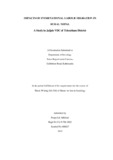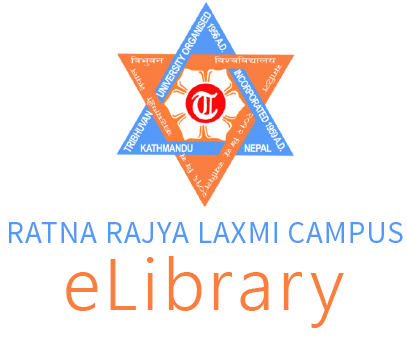Please use this identifier to cite or link to this item:
http://eibrary.ratnarajyalaxmicampus.edu.np:8080/handle/123456789/117| Title: | IMPACTS OF INTERNATIONAL LABOUR MIGRATION IN RURAL NEPAL: A Study in Jaljale VDC of Tehrathum District |
| Authors: | Adhikari, Ramesh Chandra Adhikari, Puspa Lal |
| Keywords: | M.A. Sociology |
| Abstract: | Labour migration is generally defined as cross–border movement for the purpose of employment in a foreign country. The authentic history of labour migration is not so long in Nepal. The trend of migration is found to be increased after Treaty of Peace and Friendship 1950 between India and Nepal. Now in worldwide 3.1 percent and 7 percent in Nepal is estimated to be migrant population. So that to make migration systematic, regulate and fruitful different international and national level instruments have been formulated till date , but its implementation is found not satisfactory due to lack of effective monitoring system and existed corruption from lower to higher order in different stages of migration process. It is found that about 56 percent of families are getting any kinds of remittances, which has contributed to about 23 percent national GDP of Nepal. Labour migration is being unsafe and problematic in both origin and destination countries for labour migrants and members of their families, that has also adversely affected to socio-cultural aspects of origin. But these kinds of issues are not addressed properly till now. More numbers of youths and adults are leaving country for the purpose of employment as a result of poverty existed in family. But proper attention has not given from concerned organizations towards managing such non-monitoring impacts of labour migration including low payment, hazardous work place, workplace injuries and even deaths, mental, sexual and physical torchers from employees. Due to massive scale of labour migration from study area the sex ratio is observed to decrease to 84 males per 100 females. For the study purpose 106 couple of labour migrants has been selected by using purposive sampling techniques. In this context, this study has made its major objective is to explore the impacts of international labour migration in Jaljale VDC of Tehrathum district. Both positive and negative impacts of labour migration are found in study area. The expenditure capacity of families has been improved besides incensement in food and nutrition, investment in education and health services and facilities. Similarly the impacts is observed on family structure including small family norms, controlling fertility rate, living standard is improved, female participation in decision making process is being increased along with improving social relationship among people and the condition of resource defect to surplus of resources have been found in study area. However, the remittance obtained from labour migration is not used in sustainable ways for the programme for capital formation. Similarly the family members need to pay high interest rate for migration, psychological tension need to bear by family members especially by children and couple. Similarly the family disputes/ breaking and reunions are common in study area. Besides that the intergeneration gap is found due to labour migration in study area. In brief it can say that labour migration has also affected to socio-economic development of individual, family and society in this VDC. In fact the GOvt, I/NGOs and other concerned organizations have not given their best efforts for managing the labour migration in study area. |
| URI: | http://202.45.147.228:8080/handle/123456789/117 |
| Appears in Collections: | English |
Files in This Item:
| File | Description | Size | Format | |
|---|---|---|---|---|
| 400827_Adhikari_PuspaLal.pdf | 733.77 kB | Adobe PDF |  View/Open |
Items in DSpace are protected by copyright, with all rights reserved, unless otherwise indicated.
